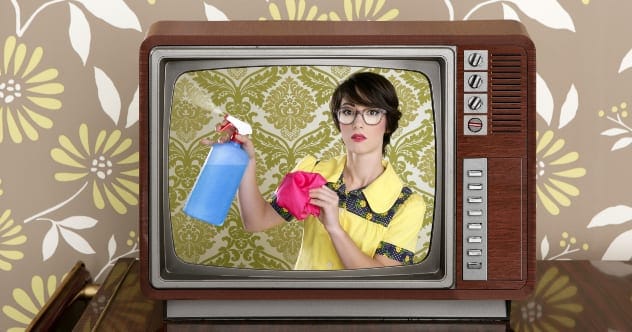Commercials. We all remember them, especially if you were around before streaming services became a thing. Now, with ad-free viewing becoming the norm, many see commercials as skippable nuisances. But let’s be real—some of those ads were pure gold, right? Whether hilarious or thought-provoking, the best ones stick with us. Think Super Bowl ads – many people tune in just to catch those, even if they don’t care about football!
Brands know that being memorable is key. They want you to remember something, even if you forget what they’re selling. To achieve this, some commercials venture into controversial territory, testing the boundaries of broadcast standards and public taste. Let’s dive into 10 commercials that you definitely won’t see on TV today.
The Flintstones Light One Up
Back in the day, cigarette ads were everywhere. It’s hard to imagine now, but they were a normal part of TV culture before being banned in 1970. Even cartoon characters got in on the act! The Flintstones, a beloved kids’ show, actually promoted Winston cigarettes. Yes, Fred and Barney were shilling tobacco! It’s wild to think that a cartoon aimed at kids would endorse smoking. Can you imagine Bart Simpson pushing Marlboros instead of Butterfingers? Yabba Dabba Don’t!
Gillette Sells a Corporate Conscience
In 2019, Gillette jumped into the #MeToo conversation with an ad urging men to be “The Best That Man Can Be.” People often say they want companies to address important social issues. Silence can be seen as acceptance. But taking a stand is tricky. Gillette’s two-minute-long commercial struggled to find its footing and ended up pleasing almost no one.
The ad faced criticism from both sides. #MeToo supporters questioned the company’s commitment, while others wondered why Gillette was taking a stand at all. If a company takes a controversial stance, it needs to be authentic, not just a sales tactic.
Pepsi Leaves Bad Aftertaste
A Pepsi commercial starring Kendall Jenner seemed harmless at first glance, but it quickly became a lesson in corporate tone-deafness. The 2017 ad showed Jenner modeling while a protest marched by. It culminated with Jenner handing a Pepsi to a police officer, who takes a sip, causing the crowd to erupt in joy. The ad was pulled after only a day due to accusations of trivializing the Black Lives Matter movement and police brutality.
Looking back, especially after seeing police solidarity with protesters (and some participating in the January 6th riot), the ad aged poorly.
Wait For the Beep
Super Bowl commercials are a big deal, but not all ads make the cut. This commercial, created for Super Bowl XXXIII in 1999, started innocently enough with a blind date. The woman gets in the car first and, thinking she’s alone, passes gas loudly. The guy then gets in and introduces her to another couple in the back seat. Awkward!
The NFL and Fox deemed it too crude. Looking back, the craziest part is that it was advertising a beeper service. What does farting have to do with beepers? Probably nothing good. Could this “memorable” ad have saved the beeper market? Probably not.
Who Would Jesus Hate?
Some ads just deserve to be censored. This one, from 2011, featured a Jesus bobblehead glaring at an Obama bobblehead until Obama falls into a fishbowl, making Jesus smile. The ad was for JesusHatesObama.com (yes, that was the actual name).
While it might have appealed to some, Fox executives knew that the Super Bowl XLV audience wouldn’t be so forgiving.
Sex Doesn’t Always Sell
National Airlines, once a top airline, is now mostly remembered for its risqué ads in the 1970s. Young, attractive women would suggest something starting with the letter F in a not-so-subtle way. “I’m Judy. Fly me.”
The burgeoning women’s liberation movement wasn’t thrilled with the airline’s blatant objectification. And it definitely wouldn’t fly today with the #MeToo movement.
Tibet isn’t Free, But You’ll Save Money
Groupon’s 2011 Super Bowl commercial was a misfire on all fronts. Most Super Bowl ads aim for laughs or tug at heartstrings, but Groupon tried to do both, and failed. 30 seconds isn’t enough time to jump from drama to comedy, especially when serious issues are involved.
The ad opened with Timothy Hutton reminding us that the Tibetan way of life is in danger. But then it quickly shifted to encouraging people to save money on fish curry at a Tibetan restaurant in Chicago. Co-opting the plight of the Tibetan people to promote cheaper dining didn’t sit well with anyone.
Beware the Bandito
It wasn’t that long ago that racial stereotypes were common in media, including commercials. The Frito Bandito, an animated character from the 1960s and 70s, was a walking, talking Mexican stereotype promoting corn chips.
Voiced by Mel Blanc (the voice of Speedy Gonzalez), the Frito Bandito now looks more like something out of a Three Amigos parody than a beloved brand mascot.
Big Mac Gets Big Cut
Sometimes, a commercial doesn’t need to be offensive to get pulled. McDonald’s ran a campaign in the mid-1980s featuring Mac Tonight, a piano player with a crescent moon face and sunglasses.
They were trying to make the fast-food chain seem cooler. However, the estate of Bobby Darin accused McDonald’s of ripping off the song “Mac The Knife.” As a bonus, the character inspired a later parody called Moon Man that angered even the most tolerant folks.
The Pizza Did It
A common trope in classic film noir is a scene where a tough guy encounters a woman having a breakdown. The image of a detective slapping a woman to “get a hold of herself” is unfortunately ingrained in our minds. This image helped normalize violence against women for a long time. Jeno’s Frozen Pizza even used it in an ad.
The man kicks down the door, and the woman screams until she realizes he’s there for dinner. While he explains how easy the pizza is to make, he hits her arm with the box – twice! Definitely not the start of a beautiful friendship.
These commercials remind us of how much advertising (and society) has changed. Some were offensive, some were tone-deaf, and some were just plain weird. But they all got the boot for pushing the wrong buttons.
What are your thoughts on these banned commercials? Which one surprised you the most? Leave your comment below!










